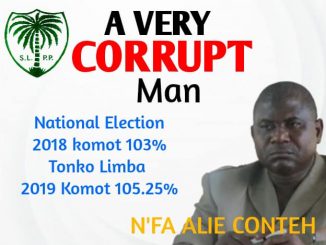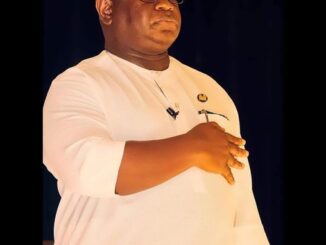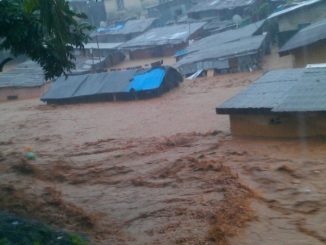By Ibrahim Mshelizza 6 minutes ago
Fugitive former Liberian President Charles Taylor was captured on Nigeria’s border with Cameroon on Wednesday, easing Nigeria’s embarrassment at his escape from imminent extradition.
President Olusegun Obasanjo, currently on a visit to Washington which has been pressing for the former warlord to stand trial for war crimes, ordered that he be immediately repatriated to Liberia, Information Minister Frank Nweke said.
The dramatic dawn arrest at a remote border crossing in Nigeria’s arid northeast was the latest twist in a saga which has divided the two West African nations and nearly derailed Obasanjo’s meeting with U.S. President George W. Bush.
“He was arrested in Borno state, at the Cameroon border, in the early hours of this morning,” said police spokesman Haz Iwendi.
The 58-year-old former warlord was seized more than 930 miles from Calabar, where he had been living in exile since 2003 until his disappearance on Monday night.
Taylor was traveling in a jeep with diplomatic plates with a woman and boy, and a large amount of money in dollars in a trunk, local officials said.
He was escorted to a military barracks in the Borno state capital Maiduguri and then to the airport where a Nigerian presidential jet was waiting. A Reuters reporter saw Taylor, dressed in a white safari suit, walk onto the runway surrounded by about 20 soldiers.
The plane later took off from Maiduguri. A security official said it would take Taylor direct to Liberia’s capital Monrovia.
U.N. peacekeepers in Liberia prepared to arrest Taylor at Monrovia’s Roberts International Airport and deliver him to a Sierra Leone war crimes court.
The United States has been pressing for Taylor to stand trial in the special U.N.-backed court in Sierra Leone. Nigeria and Liberia have been at odds over how to handle the case since Liberia’s newly-elected president asked for him to be handed over in early March.
“President Obasanjo has ordered the immediate repatriation of Charles Taylor to Liberia … to help the government of Liberia which had requested custody of the former president,” Nweke, the information minister, said in a statement.
CHARGES
Taylor went into exile as part of a deal to end 14 years of civil war in Liberia that spilled over into nearby states.
In Sierra Leone, he is accused of supporting rebels notorious for hacking off the limbs of civilians in exchange for diamonds to finance the Liberian conflict. An estimated 300,000 died in the wars that spawned a generation of child soldiers.
Nigeria had resisted sending Taylor to Sierra Leone, arguing that the terms of his asylum stated that he could only be returned to Liberia.
Some fear that Taylor’s presence in Liberia could spark renewed bloodshed in the region as it recovers from the devastating conflict.
Taylor’s disappearance from his residence on Monday caused an international outcry. Some U.S. congressmen urged Bush to cancel Wednesday’s meeting with Obasanjo.
Nweke’s statement said the meeting was going ahead and the two presidents would discuss the matter of Taylor’s disappearance from Calabar.
Nweke said Obasanjo and Bush would also discuss bilateral issues and matters of security, conflict resolution and developments in Africa. The United States has major oil interests in Nigeria, its fifth biggest supplier of crude.
(Additional reporting by Estelle Shirbon and Felix Onuah in Abuja, Tom Ashby in Lagos)
Ex-Liberian Leader Captured in Nigeria
By BASHIR ADIGUN, Associated Press Writer 6 minutes ago
Former Liberian President Charles Taylor, who vanished in Nigeria after authorities reluctantly agreed to transfer him to a war crimes tribunal, was arrested trying to cross the border into Cameroon, Nigerian police said Wednesday.
Taylor was captured Tuesday night by security forces in the far northeastern border town of Gamboru, in Borno State, nearly 600 miles from the villa in southern Calabar from which he reportedly disappeared Monday night, Information Minister Frank Nweke said in a statement.
President Olusegun Obasanjo, on a visit to the United States, ordered Taylor’s “immediate repatriation” to Liberia, the statement said.
Taylor disappeared just days after Nigeria, which had granted him asylum under a 2003 agreement that helped end Liberia’s 14-year civil war, bowed to pressure to surrender Taylor to face justice.
The admission that Taylor had slipped away came an hour before Obasanjo left Nigeria on a presidential jet headed for Washington, where he was scheduled to meet with President Bush on Wednesday. The White house had suggested the meeting might be canceled if Nigeria’s leader didn’t have some answers for Bush about Taylor’s disappearance.
Nigeria had announced it would hand Taylor over to a U.N.-backed tribunal to be tried for alleged war crimes related to Sierra Leone’s 1991-2001 civil war, but the government made no moves to arrest him before he disappeared.
Taylor, a one-time warlord and rebel leader, is charged with backing Sierra Leone rebels, including child fighters, who terrorized victims by chopping off body parts. He would be the first African leader to face trial for crimes against humanity.
While the Sierra Leone tribunal’s charges refer only to the war there, Taylor also has been accused of starting civil war in Liberia and of harboring al-Qaida suicide bombers who attacked the U.S. embassies in Kenya and Tanzania in 1998, killing more than 200 people.
Obasanjo initially resisted calls to surrender Taylor. But Saturday, after Liberia’s new President Ellen Johnson Sirleaf asked that Taylor be handed over for trial, Obasanjo agreed.
On Wednesday, neither the Liberian government nor officials of the 15,000-troop U.N. peacekeeping force would comment on Taylor’s arrest. But six white armored personnel carriers were seen driving toward the international airport outside the capital, Monrovia, apparently to stand by should Nigeria immediately fly Taylor there.
Security officials in Liberia said they had arrested several Taylor supporters, allegedly for holding secret meetings to plot how Taylor could avoid standing trial.
The U.N. Security Council had expressed surprise and concern at Taylor’s disappearance and Secretary-General Kofi Annan had said he planned to talk to the Nigerian authorities about it. He urged all countries to refuse to give Taylor refuge.
The U.N. tribunal’s prosecutor, Desmond de Silva, warned that Taylor was “a threat to the peace and security of West Africa.”
Many of Taylor’s loyalist soldiers are believed to be roaming freely in Liberia, Sierra Leone and civil-war divided Ivory Coast, from where Taylor launched his rebel incursion into Liberia on Dec. 24, 1989.
Nigeria seizes Taylor and promises to send him home
55 minutes ago
Nigeria has captured Liberia’a notorious ex-leader Charles Taylor, and vowed to send him home so that he might then be extradited to neighboring Sierra Leone to face a long list of charges including crimes against humanity.
Nigerian Information Minister Frank Nweke told reporters that President Olusegun Obasanjo, in Washington on a state visit, “ordered the immediate repatriation of Charles Taylor to Liberia” upon being informed of the fugitive’s arrest.
Earlier, a witness told AFP that the former warlord was arrested when he attempted to pass across the Gamboringala border post from Nigeria into Cameroon in a Range Rover jeep carrying diplomatic plates and a large sum of US dollars.
The news of Taylor’s arrest came only hours before Obasanjo — facing sharp international criticism for allowing the former Liberian president to disappear from his exile home — was scheduled to meet with US President George W. Bush.
The Liberian government had earlier this month requested that Taylor be extradited, and is now expected to expel him in turn to neighbouring Sierra Leone, where international prosecutors are waiting to try him on a host of charges including crimes against humanity.
Taylor — a Libyan-trained former guerrilla chieftain — is considered the single most powerful figure behind a series of civil wars in Liberia and Sierra Leone between 1989 and 2003 which left around 400,000 people dead.
Prosecutors at Sierra Leone’s UN-backed Special Court allege he sponsored the brutal rebels of the Revolutionary United Front (RUF) as they slaughtered, maimed, raped and enslaved tens of thousands of civilians during the 1990s.
The Special Court has drawn up a 17-count charge sheet alleging crimes against humanity, murder, sexual violence and unlawful use of child soldiers. The call for extradition is supported by the United States, the United Nations and various human rights organisations.
As a rebel army was closing in on Taylor’s capital Monrovia in August 2003, west African leaders saw an opportunity to bring Liberia’s latest 14-year-old bout of bloodshed to an end by persuading him to flee to Nigeria.
Until he disappeared this week, Taylor lived in exile in a plush riverside villa in the southeastern city of Calabar, though pressure mounted for his arrest amid accusations that he was continued to meddle in the affairs of his homeland and Obasanjo.
On Saturday, Obasanjo finally said he had agreed in principle to allow Liberia “to take custody of Taylor”, but gave no indication of how it might do so.
On Tuesday, embarrassed Nigerian officials said he had “disappeared”.
The warlord’s apparent escape provoked international outrage and Obasanjo arrived in the United States to find his government had been sternly rebuked by the White House, which demanded Taylor’s capture and extradition.
Then, on Wednesday, came news of the arrest.
“He was arrested in the early hours of today. He is currently with the security agents. He will be flown to Abuja later,” Nigeria’s national police spokesman Haz Iwendi, told AFP.
Babagana Alhaji Kata, a trader working near the Gamgoringala border post, said that Taylor had arrived at the frontier in an ash-coloured Range Rover jeep with the diplomatic corps number plate 81 CD 85.
“He was wearing a white flowing robe,” Kata said.
“He passed through immigration but when he reached customs they were suspicious and they insisted on searching the jeep, where they found a large amount of US dollars,” he added.
“After a further search they discovered he was Charles Taylor,” he said.
Kata said that Taylor was taken away towards the Borno State capital Maiduguri escorted by two soldiers, two immigration officers and two customs officials.
Officials in Maiduguri confirmed they were awaiting his arrival.




Leave a Reply